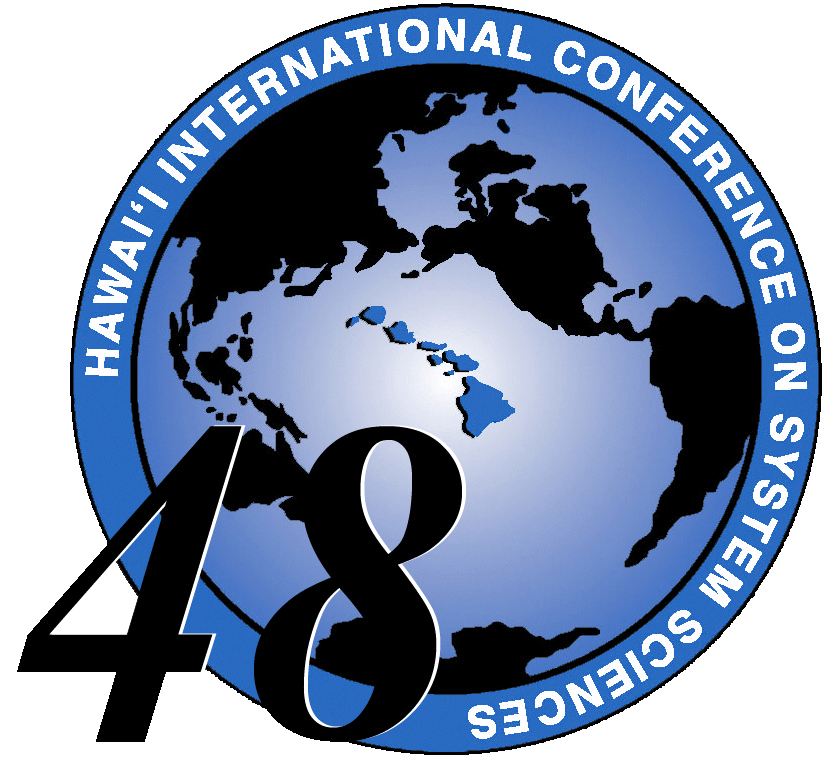HICSS - 48 E-Government Track
48th Hawaii International Conference on System Sciences
January 5-8, 2015 - Grand Hyatt, Koloa/Kauai, HI, USA
Overview
Minitracks
Symposia and Workshops
Other Links
Big, Open, Linked Data (BOLD), Analytics, and Interoperability Infrastructures in Government



Open data in government is a recent phenomenon in which public sector information is made available and can be used by everybody for what it seems an unlimited amount of purposes. As publicly available information can often be generated and provided in huge amounts and through multiple sources, specific needs for processing, curation, linking, visualization and maintenance result in the need for big data and linked data approaches.
Data collection, processing and distribution is facilitated by infrastructures providing generic facilities supporting organizational collaboration, service provision, business process management. To cope with the recent open and collaborative governance developments, applications and generic platforms are developed to enable interoperability on top of which others can utilize open data and develop comprehensive services, interoperability being the ability of diverse systems and organizations to work together. Furthermore, cloud services are now changing the ways of providing and using ICT, based on virtualized resources meeting security, privacy and scalability requirements. Clouds provide the opportunity to share resources and provide shared services over the Internet, so that administrations, enterprises and citizens can benefit from open data and shared services. All these developments are changing the way governments operate and collaborate with private sector enterprises and the society and impact the technical, organizational, managerial and strategic level.
This minitrack is aimed at discussing theories, methodologies, experience reports, literature and case studies in the field of Big, Open, Linked Data (BOLD), BOLD Analytics, and Interoperability Infrastructures in Government. We solicit for papers covering both technical and organizational aspects and combining theory and practice. Papers covering the topics below are strongly encouraged. We promote a diversity of research methods to study the challenges of this multifaceted discipline focusing on various aspects of interoperability and also theoretical papers and papers from developing countries.
Minitrack topics include, but are not limited to:
- Open and Linked data methods and technologies leading to enhanced digital public services
- Big data applications and approaches utilizing huge amounts of Public Sector information
- Big data applications for governments and societies, leading to better decision making and tackling of societal challenges
- Big, open, and linked data (BOLD) analytics
- Metadata and semantic approaches for public sector information organization
- Interoperability and architectural standards, principles and frameworks for the public sector
- Technical, semantic, organizational, managerial and legal/policy aspects of interoperability
- System development, implementation and agility approaches for digital public services
- System, user, data and process-based integration
- Information and cloud infrastructures for opening data and services to the public
- Reuse and data quality in digital public services
- Semantic ontologies, web services and modeling for governmental infrastructures
- Cloud computing, ICT-services, scalability, reliability, flexibility
- Multi-sided platforms, interoperability, information sharing and business models
- Software as service (SaaS), utility computing, shared services, cloud providers
- Cross-organizational modeling and visualization ranging from the organizational to technical level
- Infrastructure and enterprise architecture planning, alignment, strategies and governance
- Organizational and/or policy perspectives on the dynamics of the infrastructure and interoperability process and barriers to interoperability
- Service-oriented architectures, web services, semantic web services, orchestration and composition
- Best practices, case studies and longitudinal studies
- Theoretical contributions and contributions from developing countries
More information on the mini-track chairs:
Yannis Charalabidis is assistant professor and head of the eGovernment Unit of the Information Systems Laboratory at the University of the Aegean, coordinating policy, research and pilot application projects for governments and enterprises worldwide. A computer engineer with a PhD in complex information systems, he has been employed for several years as an executive director in Singular Group, leading software products development and company expansion in Europe and the US. During the last years he is also a member of the Greek Interoperability Center, a regional excellence centre promoting interoperability for administrations and enterprises. He has been conducting several FP6, FP7, eInfrastructures, CIP/PSP and national research projects in the areas of eGovernment Information Systems and Services, eParticipation, Policy Modelling, Open Data, Interoperability Frameworks and Government Transformation. He has published more than 150 papers in refereed journals and conferences and is a member in several IFIP, IEEE, W3C, CEN, government and industry committees. He is the Best Paper Award winner ot the EGOV 2008 and 2012 Conferences, Best e-government Paper Nominee at the 42nd HICSS Conference and 1st Prize Nominee at the 2009 European eGovernment Awards.
Marijn Janssen is Antoni van Leeuwenhoek-Professor in ICT and Governance and head of the ICT section of the Technology, Policy and Management Faculty of Delft University of Technology. He conducted and managed a large number of research projects and published over 240 refereed publications and serves on several editorial boards and conferences in the area of e-government. He is conference chair of the annual IFIP EGOV conference series. For more information, visit www.tbm.tudelft.nl/marijnj.
Helmut Krcmar holds the Chair for Information Systems, Faculty of Informatics, Technische Universität München (TUM), Germany and serves as Vice-Dean of the Faculty of Informatics. He is also a member of the faculty of the TUM Business School. He received a Ph.D. in business administration (University of Saarbrücken) and has worked as Post Doctoral Fellow at the IBM Los Angeles Scientific Center and as Assistant Professor of Information Systems (Leonard Stern Graduate School of Business, New York University and Baruch College, City University of New York). 1987 to 2002 he held the Chair for Information Systems, Hohenheim University, Stuttgart, Germany, where he served as Dean of the Faculty of Business, Economics and Social Sciences from 2000 to 2002. His research interests include Information and Knowledge Management, IT-enabled Value webs, Service Management, Computer Supported Cooperative Work and Information Systems in Health Care and eGovernment.
Co-Chairs
Yannis Charalabidis
(Primary Contact)
Information Systems Laboratory
Department of Information and Communication Systems Engineering
University of the Aegean
83200 Samos, Greece
Tel: +30-22-730-82221
Email: yannisx@aegean.gr
Marijn Janssen
Faculty of Technology, Policy and Management
Delft University of Technology
Jaffalaan 5
NL-2600 GA Delft
The Netherlands
Tel: +31-15-278-1140
Email: m.f.w.h.a.janssen@tudelft.nl
Helmut Krcmar
Technische Universität München
Chair for Information Systems
Boltzmannstr. 3
D-85748 Garching bei
München, Germany
Tel: +49-89-289-19530
Fax: +49-89-289-19533
krcmar@in.tum.de
